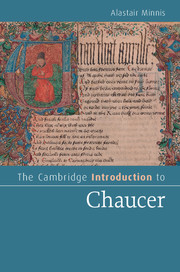Book contents
- Frontmatter
- Contents
- List of illustrations
- List of abbreviations
- Introduction Life and historical contexts
- Chapter 1 Love and lore: the shorter poems
- Chapter 2 Fictions of antiquity: Troilus and Criseyde and The Legend of Good Women
- Chapter 3 The Canterbury Tales, I: war, love, laughter
- Chapter 4 The Canterbury Tales, II: experience and authority
- Afterword
- Notes
- Further reading
- Index
Chapter 4 - The Canterbury Tales, II: experience and authority
Published online by Cambridge University Press: 05 October 2014
- Frontmatter
- Contents
- List of illustrations
- List of abbreviations
- Introduction Life and historical contexts
- Chapter 1 Love and lore: the shorter poems
- Chapter 2 Fictions of antiquity: Troilus and Criseyde and The Legend of Good Women
- Chapter 3 The Canterbury Tales, I: war, love, laughter
- Chapter 4 The Canterbury Tales, II: experience and authority
- Afterword
- Notes
- Further reading
- Index
Summary
Wel oughte us…on olde bokes leve,
There as there is non other assay by preve.
(LGW G Pro 27–8)
Here the textual authority of old books is set in contrast with proof by other means. Citation of auctoritees (extracts from the revered auctores) was a long-established means of discovering the truth of any matter – what some divinely inspired biblical writer had to say on a given subject was proof enough. But sometimes, as in this passage from the Legend, deployment of auctoritee and assay by preve were separated out, as two possible ways to truth. The latter could be quite sufficient, as when Chaucer’s Knight remarks that the prime mover of the universe has fixed certain durations of time to whatever is begotten, born, and dies. In this matter ‘Ther nedeth noght noon auctoritee t’allegge, | For it is preeved by experience’ (KnT I.3000–1). Here ‘preve’ designates the evidence of one’s own eyes.
In Chaucer’s day the English terms experience and experiment (following the Latin experientia and experimentum) were regularly applied in discussion of knowledge acquired through personal observation of natural events (cf. pp. 70–1 above). However, experientia was not necessarily regarded as functioning in opposition to what one read in some old book. What to us is textual authority may have been personal experience to a given auctor, and/or one’s personal experience could be quite consonant with what a given auctor had said. Very often auctoritee and experience were treated as mutually supportive, as when, in his Treatise on the Astrolabe Chaucer appeals to his own experience (‘had I of this conclusioun the ful experience’, ‘By experience I wot wel’) in the course of a work compiled ‘of the labour of olde astrologiens’.
- Type
- Chapter
- Information
- The Cambridge Introduction to Chaucer , pp. 98 - 138Publisher: Cambridge University PressPrint publication year: 2014

